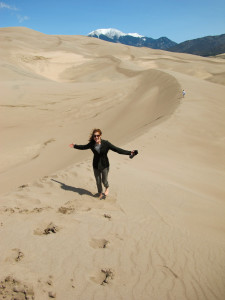I showed up at Byron a few weeks before starting a new role in an old workplace. I had manifested a full-time Theatre teaching job—with middle schoolers, nonetheless. I was full of ideas and visions, but was afraid that all of it would be ‘too much,’ that I would be written off as some ‘crazy theatre lady’ and told to ‘turn it down.’
While at Byron, I was broken open by a soft, provocative whisper. “What if you embrace the ‘crazy theatre lady’? What if she is the ‘way of being’ that is necessary to manifest your vision?”
Immediately, my mental excuses started flooding in… ‘I will lose all credibility; once I step into the ‘Arts’ and ‘Social Justice’ as my languages, people will no longer trust me; no one will see how smart and rational I am anymore; I will never get it all done; I will never be enough; people will think I’m too extreme, too ambitious, too big; people aren’t ready for my voice or my vision…’
As I was pelted by waves of self-doubt and fear, I also had a soft knowing. In addition, to support my quiet wisdom, I had the voices of mentors to help me along. Ken Robinson says not to fall prey to the “tyranny of commonsense.” Harry Pickens pointed out, with relief, that it was me that I had to fight with—these internal voices were so much stronger than any of the external ones. Jasmine Hamilton looked at me, with her eyebrows wisely tilted, and said: “You gotta embrace ‘crazy theatre lady.’”
If Byron helped me with one thing, it was that I had to stop waiting for the time to be right; I had to stop waiting to be ‘ready’ and simply be. Gabe Grant – co-founder and mentor of the Byron Fellowship – started off the whole fellowship with this invitation: “If you’re waiting for ‘it’ to start, this is it. It has started.”
And if ‘it’ has started, if this is my life, then ready or not, here I am. Over the past semester of my new job, I find myself regularly invoking my ‘crazy theatre lady.’ Instead of cutting off my own legs with worries about “pushing too far,” I am having the conversations I have been longing to have with my students, their parents, and the administration. I am inviting my students to play and write their own vision statements and embody their truths through art, instead of limiting their expression out of my own fear of what the ‘audience’ will think.
This semester has been hard—in many ways, I feel more acutely aware of my own fear and anxiety. I feel more exposed and more emotional. At first, I thought this was because my anxiety levels had gone up. However, I think it is actually because I am vulnerably invested in the home, classroom, art, and conversations about equity that are blossoming around me. This feels precarious and terrifying, while at the same time it feels humbling, joyful and in tune.
I don’t think that I could wake up every day and leap off the cliff if I did not feel all the hands on my back of all the people who love and believe in me. I could not believe so tenaciously in my students if I didn’t feel the firm belief of my mentors, friends, and of the Byron fellowship. Their love strengthens my spine and softens my heart.
So here it is—my ever-evolving vision statement: I dare to envision a home, a classroom, an artistic community where we express our hearts, all of our hearts; where we play joyfully, cry out courageously, ask for help humbly, and listen compassionately. I envision a world where we befriend our fear and vulnerability; where we sit in open conversation with others and ourselves; where we “participate joyfully in the sorrows of the world;” * where we are present and we are enough.
I become undone when I reach out and touch what I was only dreaming about a few months ago. I am still afraid. I still feel the scrutinizing eyes of an audience. But what a relief it has been to leap, and keep leaping, into the irrationality and power of my own vision.
*from Joseph Campbell

